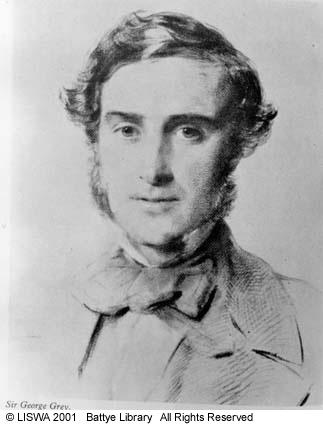|
|
|||
|
|
|
|
|
|
|
|||
GEORGE GREY1812 - 1898
|
|
|
|
|
George Grey Jr. was born in Portugal (the only son of Lieutenant-Colonel George Grey Sr.) Just a week before he was born, George's father was killed at the battle of Badajoz and his mother (Elizabeth Anne, née Vignoles) later re-married Rev. Sir John Thomas, baronet of Wivenhoe in 1817.
George was educated in England, running away from boarding school to join the British military serving with the 83rd Regiment of Foot. While with the regiment in Ireland, George developed a great sympathy for the plight of the Irish and did not approve of the way they were treated by his fellow officers.
After reading of Sturt's expeditions in Australia he applied to the Colonial Office to lead an expedition to he north west of Australia. His request was granted an in 1837 he sailed with a party of explorers to Cape Town and then on to the Kimberley coast.
The expedition began in December (the start of the rainy season) and this led Grey to write 'No country in the world is better watered than this portion of Australia.' His reports about this area were the trigger for the foundation of a new settlement at Camden Harbour that was in the end, a total disaster. (**)
The party started at Hanover Bay and moved inland discovering the Glenelg River. They were attacked by Aborigines and Grey was wounded. As supplies were running low they returned to the ship and sailed to Mauritius where Grey recovered from his wound.
|
|
In 1838 Grey arrived at the Swan River Colony and made some short excursions to Williams and Busselton. In February 1839 he led an expedition north along the west coast. (The party consisted of Grey, Auger, Coles, Woods, Hackney, Kaiber (an Aborigine), Walker, Smith, Ruston, Woods, Stiles and Clotworthy.)
Grey's exploration was met with one disaster after another and after losing all his boats he and his party had to walk all the way back to Perth.
To start with Grey was only equipped with three whale boats and only 3 of the 12 men with him were experienced sailors. They landed on Bernier Island to bury supplies for later use and while there lost one boat and had to repair the other two after a severe storm.
Supplies and water were lost, so the party moved to the mainland and found fresh water. From here they travelled north but finding nothing promising returned to Bernier Island to dig up their supplies. On landing they found that tides had swept the area and their supplies were scattered or ruined.
The two remaining boats with little supplies and water rowed off into a head wind arriving at Gantheaume Bay where both boats were wrecked in huge surf as the party tried to land. Now 500 kilometres from Perth the men had to face a long trek through unknown country.
Along the way, Grey discovered and named the Gascoyne, Murchison (after Roderick Impey Murchison, President of the Royal Geographic Society.) Hutt, Bowes, Buller, Chapman, Greenough, Irwin, Arrowsmith and Smith rivers. The party passed by what is now known as Kalbarri but was named Kaiber by the Aborigines.
The party divided in two, with the weaker men lagging behind as those in better health pressed on towards help.
Grey wrote in his journal as he pressed further south: 'A disinclination to move pervaded the whole, and I had much the same desire to sink into the sleep of death... My Life was not worth the magnitude of the effort that it cost me to move; but other lives depended on mine, so I rose up weak and giddy, and by degrees induced the rest to start also.'
Once Grey reached Perth (April 21 1839) search parties were sent out to rescue the second half of the men.
All but one had survived. The man who died was Frederick Smith (Smyth), a cousin of Florence Nightingale. His body was found on the beach two miles south of present day Lancelin. He was just 19. It is surprising that only one man was lost on the journey.
Grey wrote of Smith:
'I deeply regretted the death of poor Frederick Smith, who came out from England expressly for the purpose of joining me. When aroused by danger or stimulated by a sense of duty he was as bold as a lion, whilst his manner was gentleness itself. He was a gallant and enterprising spirit.'
Grey knew first hand what sacrifices the first explorers had to make and he later wrote in his journals:
'A strange sun shines upon their lonely graves... ...but let us hope when civilization has spread so far, that their graves will be sacred spots, that future settlers will sometimes shed a tear over the remains of the first explorer, and tell their children how much they are indebted to the enthusiasm, perseverance, and courage of him who lies buried here.'
Grey went on to be Resident Magistrate at Albany, Governor of South Australia, twice Governor and then Premier of New Zealand, High Commissioner of South Africa and he served on the British Privy Council 4 years before he died aged 85.
Grey's tactics as Governor of South Australia and New Zealand met with a great amount of criticism and Frederick Weld called him 'the artful Dodger of governors'.
A small 'l' liberal idealist, Grey's ideas were somewhat ahead of their time. His lack of self-control and inability to recognise his own failings were to lead to much criticism and were to blame for the lack of success of many of his projects. Grey was also an ardent naturalist and collected many specimens for institutions such as Kensington Museum and Kew Gardens.
(**) D.W. Carnegie - an explorer and prospector - was later to write expeditions such as those grey had led: 'What a marvellous transformation the winter rains cause! It is then that the expert, or journalist walks abroad; it is then that we read such glowing accounts of rich grass lands, watered by countless creeks, only awaiting the coming of the agriculturalist to be turned into smiling farms and fertile fields.'
Journals of Two Expeditions of Discovery in North West and Western Australia.
Chronology
1812 - Born April 14th in Lisbon, Portugal. 1820 - Sent to boarding school in Guildford (England) but ran away. 1826 - Attended Royal Military College, Sandhurst. 1830 - Joined the 83rd Regiment in Ireland as an ensign. 1833 - Promoted to lieutenant. 1836 - Wrote to the Colonial Office offering to lead an expedition to the north west of Western Australia. 1837 - Sailed on the Beagle to Western Australia stopping at Cape Town. 1837 - Landed at Hanover Bay in December. 1838 - Grey speared by Aborigines on February 10th. Grey recovered and returned to Hanover Bay in April. 1838 - Picked up by ship and sailed to Mauritius to recover. 1838 - Sailed to Perth in September. 1839 - Led an expedition to Shark Bay in February. 1839 - Problems led to the expedition abandoning its intended goal of North West Cape and the members head south along the coast towards Perth. Grey reached Perth in April. 1839 - Promoted to Captain in June and became resident magistrate at King George Sound (Albany). 1839 - Married Eliza Lucy Spencer on November 2nd. 1840 - Published Vocabulary of the Dialects spoken by the Aboriginal Races of South-Western Australia. 1840 - In March Grey (with his wife) returned to England. 1841 - Published Journal of Two Expeditions of Discovery in North-West and Western Australia During the Years 1837, 38, and 39. 1841 - Appointed Governor of South Australia and resigned from the army.. 1841 - Arrived in Adelaide on May 10th. Just 4 weeks later his only son died aged just 5 months. 1843 - Establishes a nominated Legislative Council in June. 1844 - After severe financial problems in the South Australian economy, Grey comes close to balancing the state budget. 1844 - Appointed Governor of New Zealand. 1845 - The South Australian Government frees itself from dependence on British grants. 1845 - Arrived in New Zealand in November. 1848 - Despite criticism, Grey was held in high regard in England and was knighted. 1853 - Recalled to England after continuing to enact policies not approved by the British government. 1854 - Appointed Governor of Cape Colony and high commissioner of South Africa in June. 1859 - After continuing to ignore 'suggestions' from the Colonial Office grey was recalled to England but the unexpectedly re-instated. 1860 - Separated from his wife. 1861 - Leaves the Cape Colony in August after being appointed Governor of New Zealand for the second time. 1868 - After grey continued to obey instructions from England he was dismissed. 1870 - Returned to New Zealand. 1874 - Re-enters politics and remains in office for the following 20 years. 1877 - Becomes Premier and serves in this position until 1879. 1889 - Succeeds in having plural voting abolished. 1891 - Attended the Australian Federal Convention. 1894 - Returned to London and reconciled with his wife but the couple remain unhappy together. 1898 - Died on September 19th.
Links to more information:
|
|
|
Become a supporter of this website for just $5 a month
|


